In the era of data-driven growth, customer relationships define business success. Companies that can centralize, analyze, and act on customer data gain a decisive advantage in retention and revenue. That’s where Customer Relationship Management (CRM) systems come in — and why hiring a dedicated CRM developer is no longer optional, but essential.
A CRM developer builds, customizes, and optimizes your CRM platform to fit your business processes — connecting marketing, sales, and service teams through seamless automation. The right expert helps you unlock valuable insights, streamline workflows, and deliver personalized experiences at scale.
According to HubSpot’s guide to CRM systems (DA 93), companies that implement CRM effectively can achieve up to 30 percent higher lead conversion and customer retention rates. But not all CRM implementations succeed — many fail due to poor customization or mismatched talent.
If you’re wondering how to hire CRM developer talent that delivers results, this complete 2025 guide from TechHub Asia outlines every step — from defining your needs to selecting the right CRM development company.
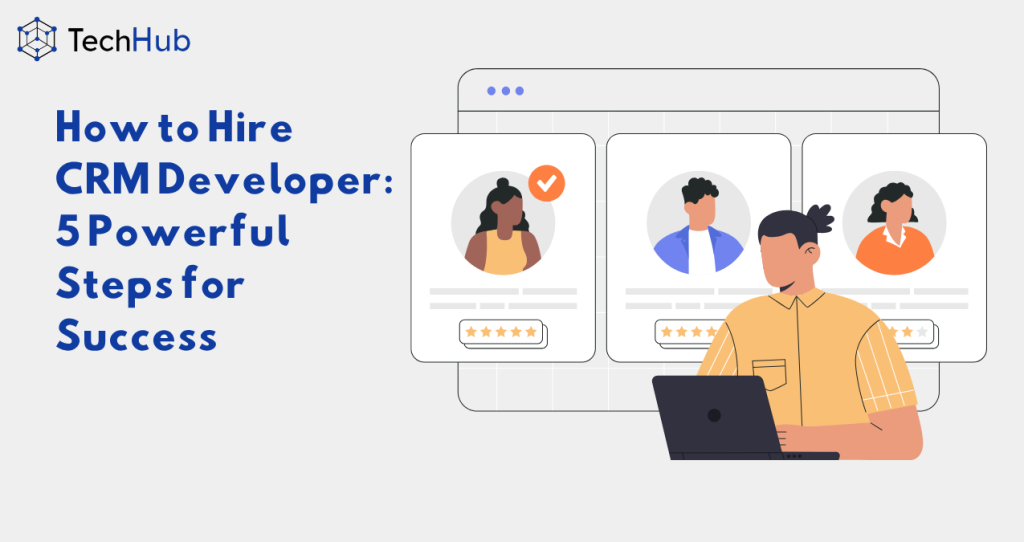
When we hire crm developers, what will they do?
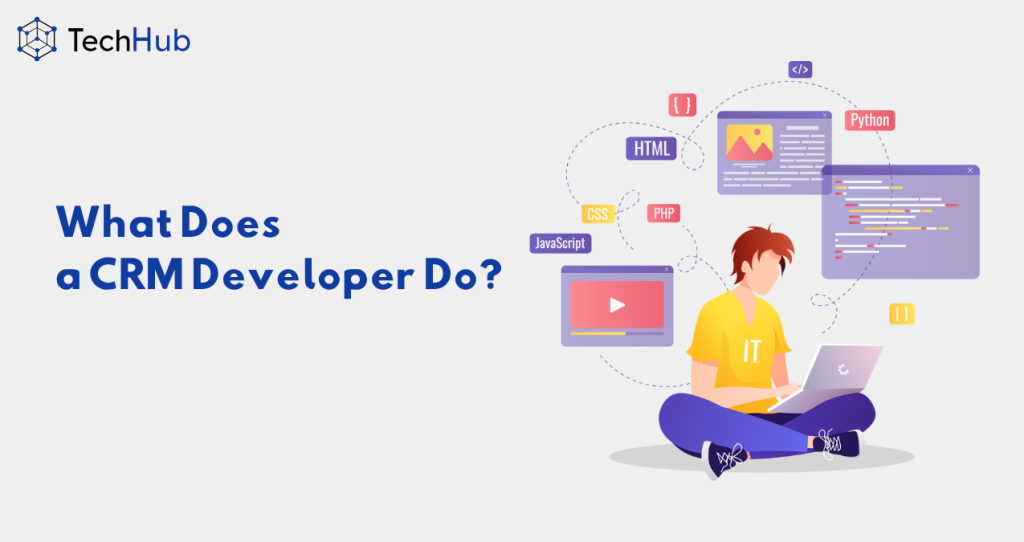
Before you decide to hire CRM developers, it’s important to understand what they actually do — and why their work directly impacts business performance.
A CRM developer is a specialized software professional responsible for tailoring CRM systems such as Salesforce, HubSpot, Microsoft Dynamics, or Zoho CRM to fit a company’s sales and customer service processes. Their goal is to transform a generic CRM into a high-performing, automated ecosystem that drives productivity and customer satisfaction.
Core Responsibilities of a CRM Developer
- Customization & Configuration: Designing dashboards, automating workflows, and integrating third-party applications.
- Integration with Business Systems: Connecting CRM with ERP, marketing automation, and payment platforms.
- Data Management: Ensuring data consistency, synchronization, and compliance with security standards.
- Performance Optimization: Enhancing system speed and user experience across departments.
Essential Skills and Tech Stack
A top-tier CRM developer for hire should possess strong knowledge of APIs, JavaScript, SQL, Python, C#, or Apex (for Salesforce). They must be proficient in CRM SDKs, automation tools, and RESTful API integrations. Beyond technical fluency, communication and problem-solving skills are vital — your developer will often act as a bridge between technical teams and business stakeholders.
For a deeper breakdown of CRM developer skills, certifications, and career paths, check out TechHub Asia’s detailed resource:
👉 How to Become a CRM Developer: Simplified Blog Structure
Step-by-Step Guide on How to Hire CRM Developer
Hiring a CRM developer isn’t just about filling a technical role — it’s about finding a strategic partner who can customize your CRM to your business goals. Follow these five key steps to ensure you choose the right expert and maximize your investment.
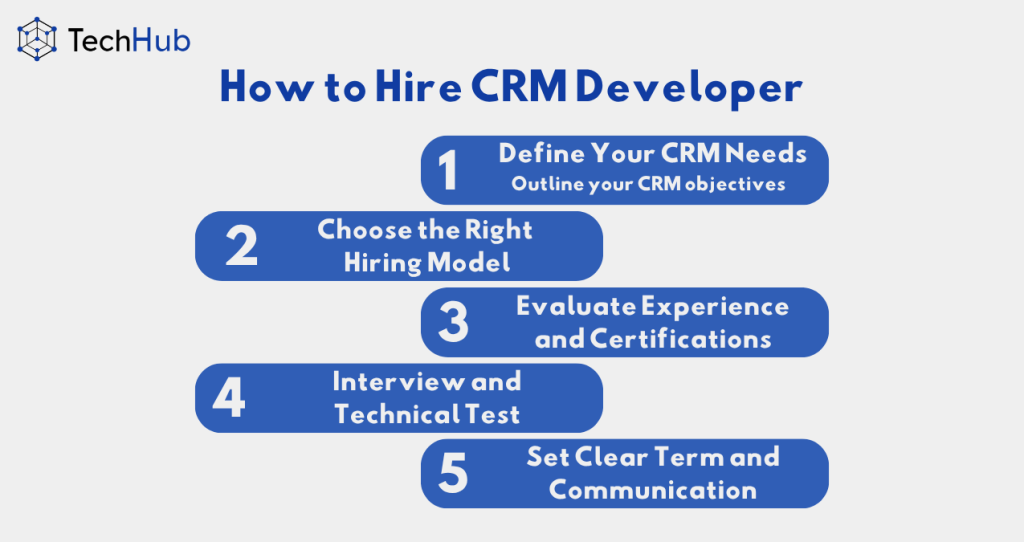
Step 1 – Define Your CRM Needs
Before searching for candidates, outline your CRM objectives clearly.
- Which platform are you using — Salesforce, HubSpot, or Zoho?
- Do you need custom dashboards, automated lead scoring, or full API integration with marketing tools?
Understanding your priorities will help you define a detailed job scope and avoid hiring the wrong specialist.
If you’re unsure where to start, TechHub Asia’s consultants can help assess your CRM maturity and create a tailored hiring roadmap.
Use this as your foundation for how to hire CRM developer talent that aligns with your business needs.
When planning to hire CRM developer for your business, it’s important to choose the right hiring model that fits your goals and budget. There’s no single approach — the best method depends on how much control and flexibility you need.
- Hire a freelance CRM developer for short-term customization, quick integrations, or small automation tasks. Freelancers are a great option when you need to hire CRM developers for limited scopes or trial projects.
- Build an in-house CRM team if you expect to scale your system continuously and require full-time maintenance. This approach ensures direct communication and faster iteration cycles.
- Partner with a CRM development company when you want to hire CRM developer resources with proven experience, technical versatility, and end-to-end delivery — from design to deployment.
Outsourcing to a reliable partner often helps businesses hire CRM developers faster while maintaining quality, scalability, and multi-platform expertise.
For further insights into modern hiring strategies, explore in-depth resources on hiring remote developers in 2025 and hiring developers in Vietnam. These guides provide practical tips on compliance, onboarding, and global workforce management — valuable for anyone looking to hire CRM developer teams effectively.
Step 3 – Evaluate Experience and Certifications
When reviewing candidates or agencies, look for proven experience with CRM platforms relevant to your business.
Essential certifications include:
- Salesforce Certified Developer / Administrator
- HubSpot Developer Certification
- Microsoft Dynamics 365 Specialist
Ask for client portfolios or demo projects. The right developer should not only understand CRM architecture but also have experience aligning technology with marketing and sales strategies.
Step 4 – Interview and Technical Test
A structured interview process is essential when you plan to hire CRM developer candidates who can deliver both technical accuracy and business impact. Instead of relying on resumes alone, design an evaluation flow that tests real-world expertise.
During the interview, focus on questions that reveal depth, adaptability, and hands-on experience:
CRM Integration & Data Migration:
Ask about past projects involving system integrations, data migration strategies, and how they ensured data consistency and accuracy.
Problem-Solving & Automation:
Explore their approach to automating customer journeys, creating workflows, and managing CRM triggers for marketing or sales pipelines.
Security & Compliance Practices:
Discuss how they handle sensitive customer information, comply with GDPR or similar standards, and ensure secure API communications.
For reference, you can explore Top 50+ Mid-Level Engineering Interview Questions.
Finally, always include a short, practical test project or coding exercise. A real-world scenario — such as customizing a CRM dashboard or integrating a mock API — will help you objectively assess the candidate’s code quality, communication, and delivery approach before you officially hire CRM developer for your team.
Step 5 – Set Clear Terms and Communication
Once you’ve selected your CRM expert, define the collaboration structure:
- Scope of work, timeline, and KPIs
- Reporting frequency and communication tools (Slack, Asana, Jira)
- Ownership of code and post-deployment support terms
Setting expectations upfront ensures accountability and transparency — the foundation of a successful partnership.
Cost to Hire CRM Developers
When you plan to hire CRM developers, understanding the cost structure helps you make informed decisions and set realistic expectations. The pricing depends on several factors — from location and skill level to project scope and engagement model.
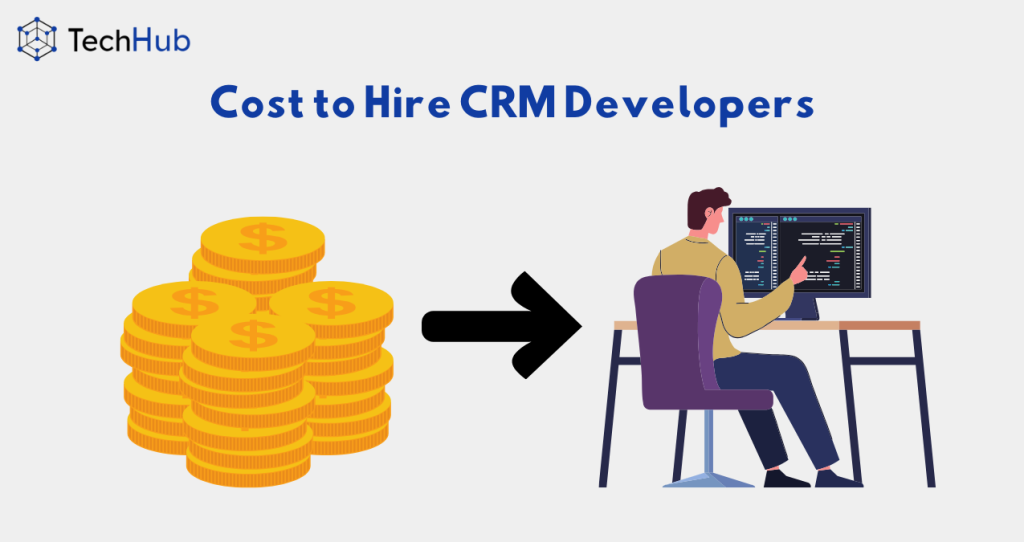
Average CRM Developer Rates by Region (2025 Overview)
| Region | Average Hourly Rate (USD) | Common Hiring Model |
| North America (US / Canada) | $80 – $150 / hour | In-house or enterprise partner |
| Western Europe (UK / Germany) | $60 – $120 / hour | Hybrid or outsourced team |
| Eastern Europe (Poland / Ukraine) | $40 – $80 / hour | Offshore development team |
| Asia (Vietnam / India) | $25 – $60 / hour | Outsourcing via CRM specialists |
Among these, Vietnam stands out as a fast-growing technology hub that delivers premium quality CRM development at significantly lower costs — making it a smart choice for startups and enterprises alike.
Key Cost Drivers
- Project Scope & Complexity
The number of integrations, automations, and third-party systems directly affects cost.
Complex Salesforce or Microsoft Dynamics customization typically requires senior-level developers. - Experience & Certification
Certified developers (e.g., Salesforce Certified, HubSpot Developer) may charge more — but their efficiency reduces long-term costs. - Engagement Model
- Freelancers: Flexible but less reliable for complex systems.
- Dedicated Developers: Cost-effective for medium to large projects.
- CRM Development Company: Offers scalability, project management, and guaranteed quality.
- Freelancers: Flexible but less reliable for complex systems.
Post-Deployment Support
Ongoing CRM maintenance, upgrades, and analytics often cost around 10–20% of the initial project value annually.
Key Cost Drivers
- Project Scope & Complexity
The number of integrations, automations, and third-party systems directly affects cost.
Complex Salesforce or Microsoft Dynamics customization typically requires senior-level developers. - Experience & Certification
Certified developers (e.g., Salesforce Certified, HubSpot Developer) may charge more — but their efficiency reduces long-term costs. - Engagement Model
- Freelancers: Flexible but less reliable for complex systems.
- Dedicated Developers: Cost-effective for medium to large projects.
- CRM Development Company: Offers scalability, project management, and guaranteed quality.
- Freelancers: Flexible but less reliable for complex systems.
Post-Deployment Support
Ongoing CRM maintenance, upgrades, and analytics often cost around 10–20% of the initial project value annually.
Partnering for Cost Efficiency
Partnering with a specialized CRM development company often results in better ROI.
You gain not only access to experienced developers but also to a complete support ecosystem — from business analysts and project managers to QA engineers.
Common Mistakes When Hiring CRM Developers
Even the most forward-thinking companies can make costly errors when hiring CRM specialists. Understanding these pitfalls in advance helps you save time, budget, and resources — while ensuring your CRM project succeeds from day one.
Here are the most common mistakes businesses make when trying to hire CRM developers, and how to avoid them:
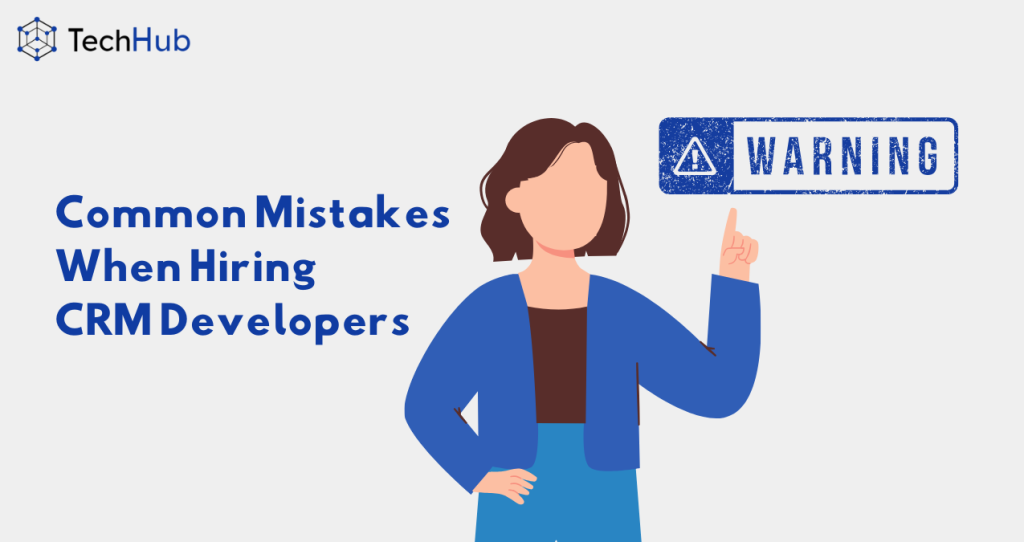
1. Not Defining Business Requirements Clearly
Many projects fail before they even begin because the business doesn’t outline its CRM goals.
Without clarity on workflows, automation needs, or reporting requirements, developers can only guess what’s needed — leading to rework and frustration.
Solution: Always document your CRM objectives, KPIs, and integration needs before recruitment.
2. Hiring Based Only on Technical Skills
Technical skills are essential, but they’re not enough. A great CRM developer for hire must also understand sales processes, marketing funnels, and customer lifecycles.
Solution: During interviews, ask scenario-based questions that assess business logic, not just coding ability.
3. Ignoring Platform-Specific Expertise
Each CRM platform (Salesforce, HubSpot, Zoho, Dynamics) has its own architecture and certification paths. Hiring a developer without proven experience in your chosen platform can cause compatibility or scalability issues.
Solution: Always verify certifications and past project portfolios.
4. Overlooking Data Security and Compliance
CRM systems hold sensitive customer data. Failing to ensure your developer follows global compliance standards (GDPR, HIPAA, ISO) can lead to severe legal consequences.
Solution: Choose developers or agencies with strong data security credentials and proven compliance frameworks.
5. Choosing the Wrong Hiring Model
Businesses often underestimate the importance of selecting the right hiring approach — freelancer, full-time, or CRM development company.
Hiring freelancers may seem cheaper initially but can cause delays, inconsistent quality, or lack of accountability.
Solution: Work with a trusted partner who offers scalable CRM development services with guaranteed delivery and support.
Read more: How to Hire Developers in Vietnam: Legal, Practical, and Strategic Insights
6. Neglecting Post-Launch Support
Many businesses treat CRM deployment as a one-time project instead of a continuous process.
Without ongoing updates, bug fixes, and optimization, even the best CRM will lose value over time.
Solution: Partner with an agency that provides ongoing support, analytics, and system scalability.
Where to hire CRM Developers for Hire
Once you’ve defined your requirements and budget, the next step is sourcing the right talent. The challenge isn’t finding CRM developers — it’s finding the right one who aligns with your technical, cultural, and business goals.
Here are the top channels where you can find and hire CRM developers effectively:
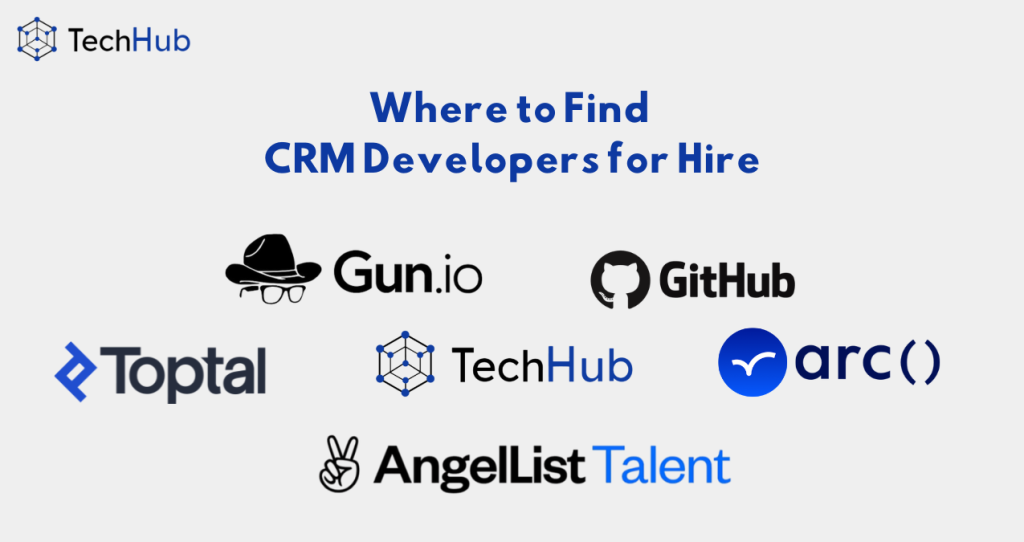
1. Freelance Platforms
Websites like Upwork, Freelancer, and Toptal provide access to thousands of independent CRM developers worldwide.
However, the quality and reliability vary greatly — freelancers often juggle multiple projects, which can lead to missed deadlines or inconsistent performance.
✅ Best For: Short-term or low-complexity CRM customization tasks.
❌ Risk: Limited accountability and post-deployment support.
2. Professional Networks
LinkedIn and GitHub are excellent platforms to discover experienced CRM professionals with verified certifications and proven technical portfolios.
By reviewing client endorsements and repositories, you can identify candidates who meet your project’s exact needs.
✅ Best For: Building direct relationships with potential hires.
❌ Risk: Requires time-consuming vetting, interviews, and onboarding.
3. Specialized CRM Development Companies
For mid to large-scale projects, partnering with a CRM development company ensures high-quality results, scalability, and accountability from day one.
These agencies provide complete CRM expertise — from consultation and system customization to long-term support.
If you’re exploring this route, consider working with TechHub Asia’s dedicated CRM development team, which connects enterprises with certified developers skilled in Salesforce, HubSpot, and Microsoft Dynamics.
Their proven approach combines technical expertise with strategic alignment — ensuring every CRM deployment drives measurable business results.
For remote or offshore collaboration, TechHub Asia’s guide on hiring remote developers offers valuable insights into managing distributed teams efficiently.
Additionally, the company’s IT staffing solutions help businesses scale fast with flexible hiring models tailored to specific project goals.
4. Regional Tech Hubs (Vietnam, Singapore, and Beyond)
Asia — particularly Vietnam — has emerged as one of the most reliable destinations for offshore CRM development.
Through TechHub Asia’s regional network, companies can hire CRM developers who deliver Western-level quality at a fraction of the cost.
Vietnam’s strong English proficiency, time-zone alignment, and tech talent pool make it an ideal hub for international partnerships.
5. Referral Networks and Industry Partnerships
Word-of-mouth and professional networks remain underrated but powerful hiring tools.
Ask your partners, industry peers, or SaaS vendors for referrals — a trusted recommendation often leads to a reliable, long-term partnership.
Conclusion
Choosing the right CRM developer isn’t just about finding technical skills — it’s about securing a strategic partner who can transform customer data into growth. From defining your needs to evaluating certifications and cost, every decision directly affects your CRM’s impact on sales, marketing, and customer retention.
Partnering with a proven CRM development company like TechHub Asia ensures that your implementation goes beyond installation — it becomes a business enabler.
With years of experience in IT staffing and offshore development, TechHub Asia helps companies worldwide hire certified CRM experts who deliver measurable ROI and long-term value.
Whether you’re looking to optimize Salesforce, migrate to HubSpot, or build a custom CRM from the ground up, our dedicated software developers combine technical precision with business insight.
Every project is guided by transparency, data security, and a commitment to results.


